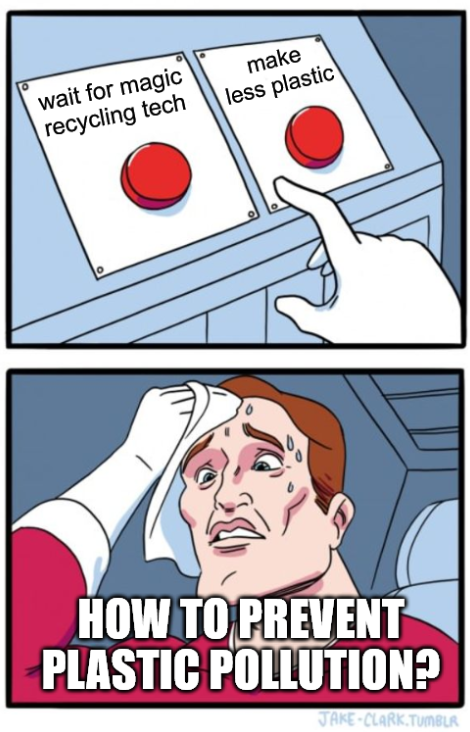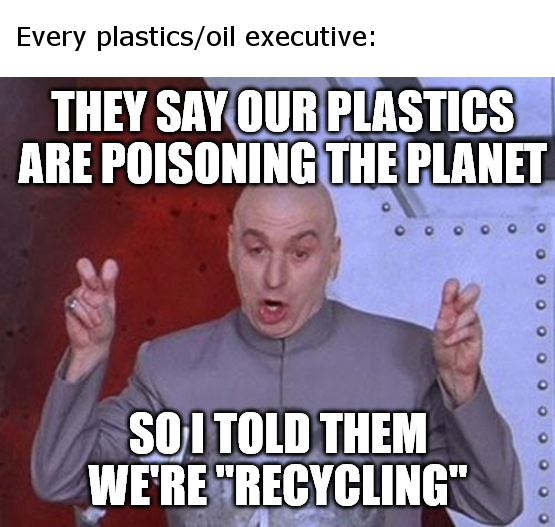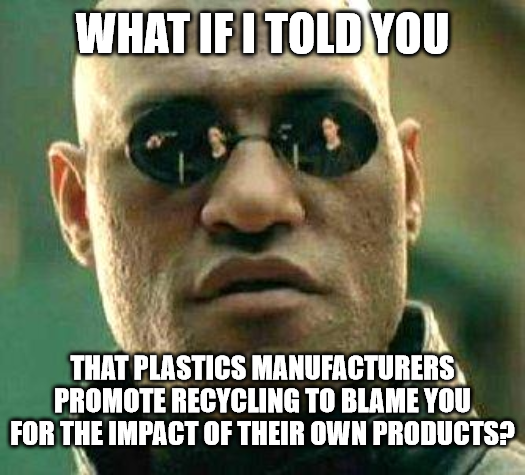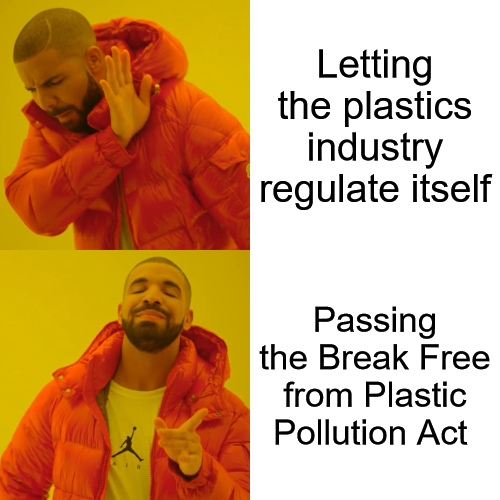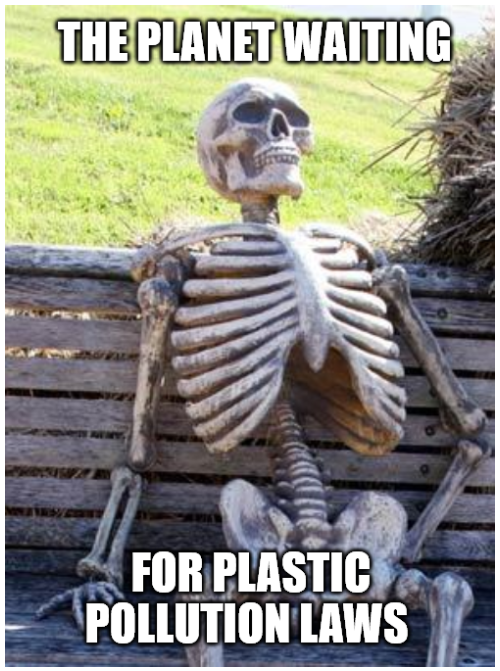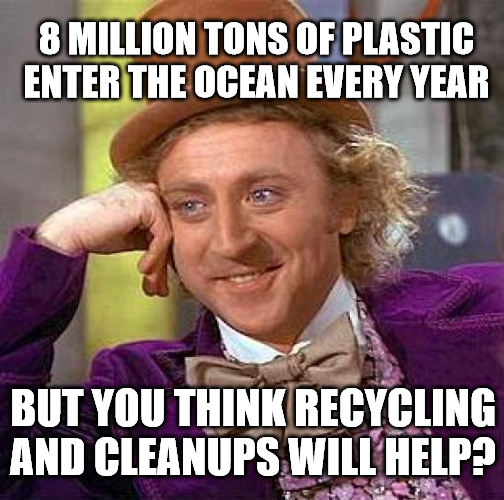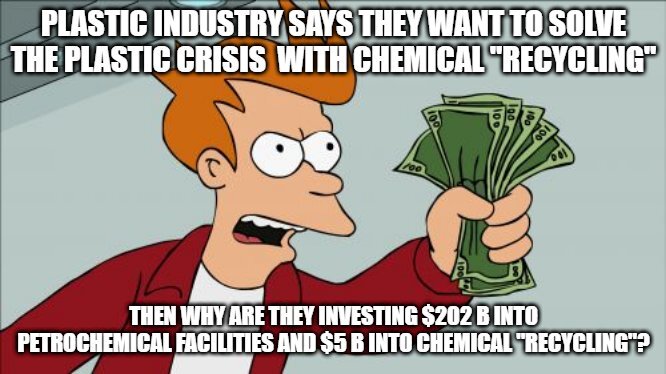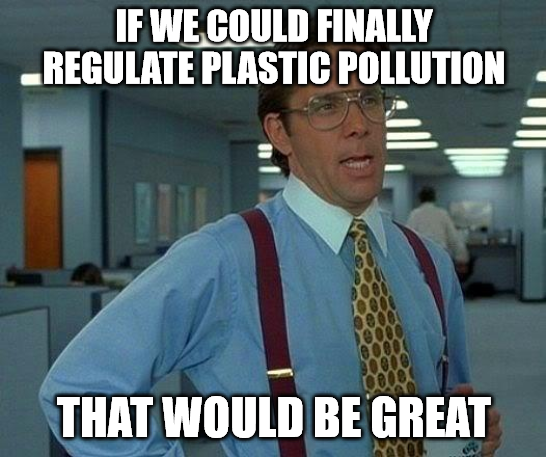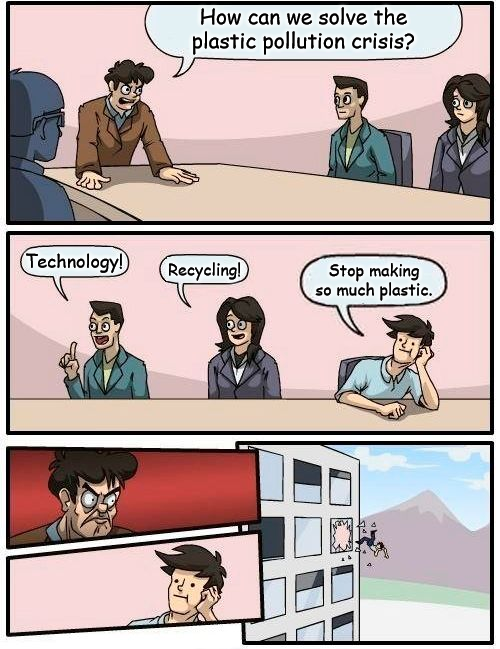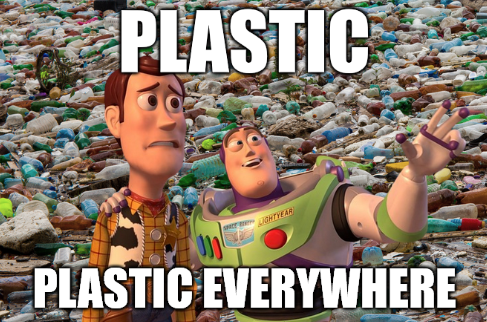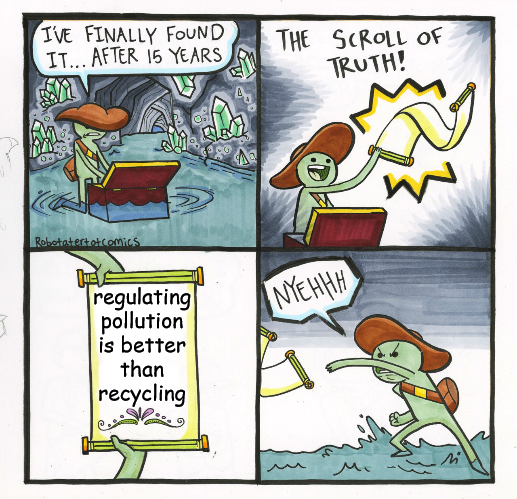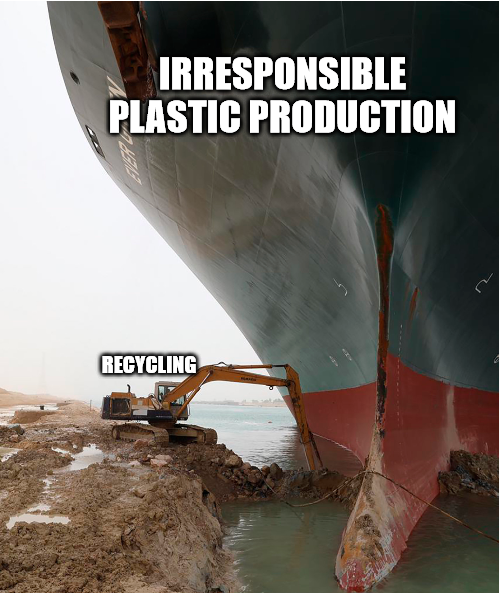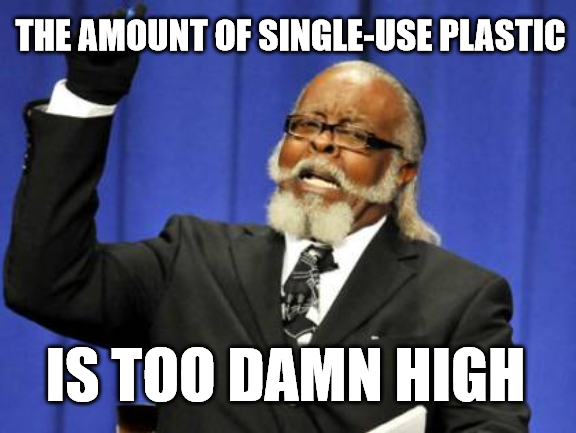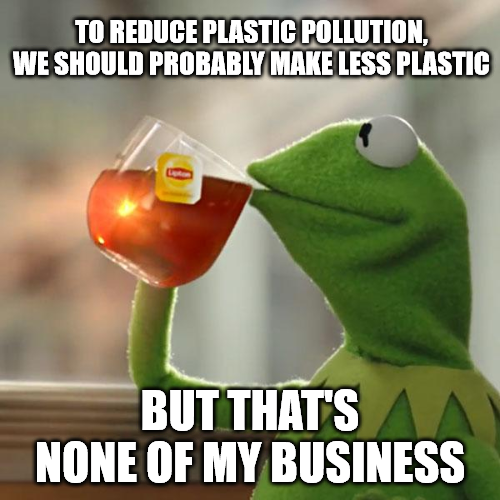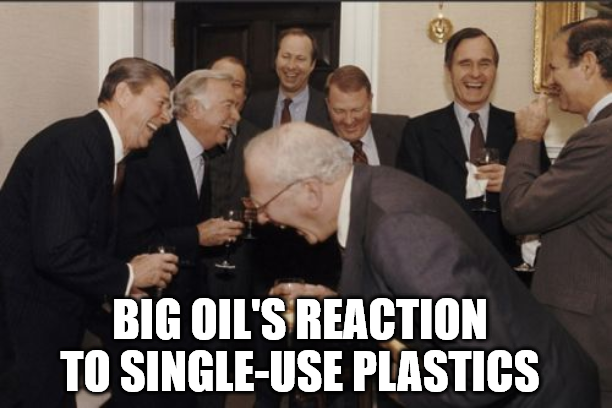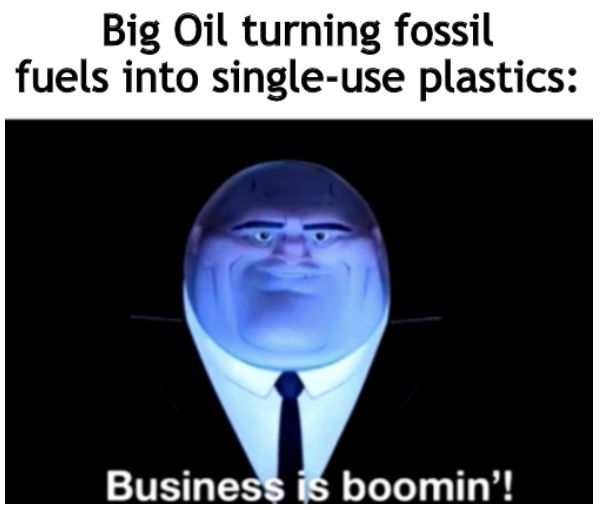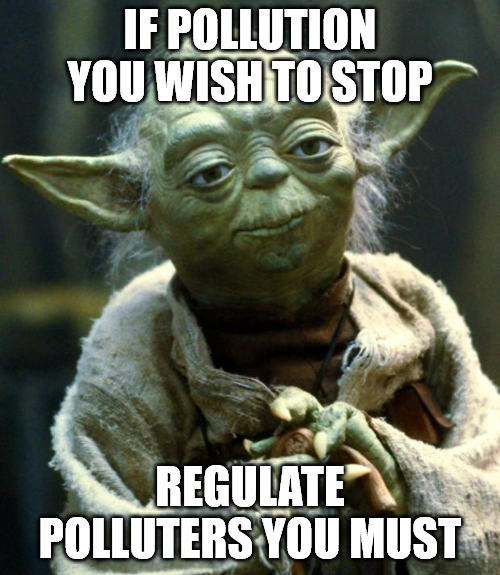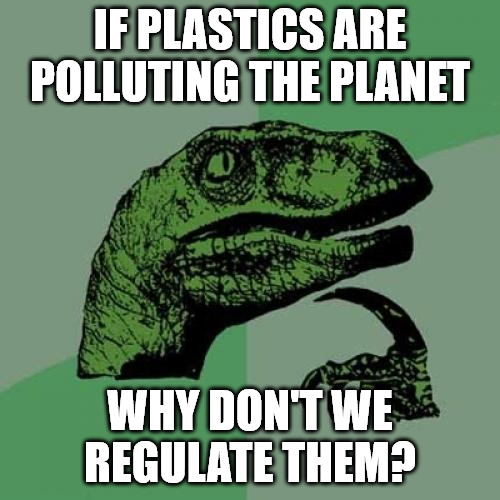MEET OUR MEME CONTEST Winner!
The winner of our Earth Day 2021 Beyond Plastics Meme Contest is Mary Krupa, a 26-year-old from State College, Pennsylvania who has always been very passionate about the environment, sustainability, and online campaigning. We loved all her memes but the one that took the prize (literally) was this one.
We were curious about the person behind our favorite meme (as well as many of our second favorite entries - scroll down to see all of Mary’s memes) so we reached out to Mary to find out a little bit more about her interest in fighting plastic pollution and were blown away by her response which we’ve included below.
Like most people, I've always been somewhat concerned about plastic pollution on a visible, superficial level -- i.e. litter is ugly and can kill wildlife -- but I didn't really get interested in the lesser-known impacts of plastic until I started following grassroots environmental groups here in PA. That's when I learned about the massive, taxpayer-subsidized petrochemical "cracker plant" that Shell Oil is building near Pittsburgh to turn fracked petroleum into single-use plastics, and the huge role that plastics manufacturing plays in the climate crisis. Once it's fully operational, that one plastic factory will produce enough greenhouse gas emissions to completely negate the carbon reductions of the entire city of Pittsburgh through 2030, just so Shell can make a profit. I was enraged by how unfair that was, and by the fact that our so-called "representatives" in government were encouraging one greedy corporation to undo the hard work of an entire city just to sell us more plastic garbage. I started researching more about the plastics industry and learned about its ties to Big Oil, its deceptive greenwashing practices, and its habit of building toxic "megapolluting" plants in communities of color and low-income areas where residents are less able to fight back.
I learned about how the plastics industry turned Black communities in Louisiana into "Cancer Alley" and built toxic chemical plants on historic gravesites of enslaved people.
I learned about the 60,000 Houston residents who had to evacuate their homes in 2019 after a major explosion and toxic fire at a nearby petrochemical plant, and how that plant had repeatedly failed to meet federal safety and environmental standards despite insisting that it was a "good neighbor."
I learned about how the industry plans to vastly increase plastic production in the coming decades, and how the massive Pittsburgh project is just one of 300+ new or expanded petrochemical factories the industry plans to build in the US. If we let them have their way, they'll turn our rivers into a huge, polluted industrial zone if it means they get to keep selling their fracked gas and oil for a little bit longer.
I learned about how ubiquitous "microplastic" pollution is in our water, air, food, and bodies. Microscopic plastic particles have been found in the human placenta, in our bloodstreams, and in the most remote places on Earth. The inspiration for my Oprah meme is the unbelievable statistic, from a WWF-funded analysis of peer-reviewed studies, that the average person likely consumes about a credit card's worth of plastic every week through microscopic particles that contaminate our water, salt, and food. We have no idea what effect this might have on human health, and there doesn't seem to be much mainstream awareness of the problem, which is why I loved your meme contest. Most people think that plastic pollution is just about straws and sea turtles, but it's so much more than that.
In short, I realized that we simply can't solve the climate crisis, ocean pollution, or so many other environmental/social issues without doing something about plastics production. The good side of this, and what drew me to Plastics Beyond, is that taking action against plastic pollution might just be one of the most effective forms of activism one can do because it directly affects multiple environmental and social problems. No matter what issue you're passionate about, whether it's climate change, the oceans, human rights, racial justice, or public health, plastic pollution is having a major impact. And it's also a problem we can do something about, because it exists right here in our own backyard. The US is one of the world's largest plastic polluters, so it's on us as citizens to urge Congress to act, and on Congress to listen to the people instead of industry lobbyists. Throughout U.S. history, we really only see true environmental progress through federal regulations, like the Clean Air and Clean Water Acts. Plastic pollution is no different.
One more thing: I'm an optimist at heart, and truly believe that the future can be a cleaner, healthier place. This might not be the most common attitude for an environmentalist to have these days, but my hope for the future comes from the past. When my mom was growing up in rural Pennsylvania in the 1970s and 1980s, she thought it was normal for the streams to run orange with acid mine pollution and for cities to be covered in smog and soot. Apparently, it was also "normal" back then for people to litter and dump trash everywhere, she never saw any bluebirds or hawks, and there were practically no Bald Eagles left in the state due to indiscriminate use of DDT. If you look at the EPA's fascinating "Documerica" series of archival photographs, US cities looked like polluted, dystopian hellscapes in the 60s and early 70s before there was any environmental regulation. Things were so bad that when the first Earth Day was held in 1970, the outlook for our present time was incredibly bleak. Then, as now, experts were issuing dire predictions for humanity if we didn't change course. According to National Geographic, there were legitimate predictions fifty years ago that “by 1985 air pollution will have reduced the amount of sunlight reaching Earth by one-half" and that it was "already too late to avoid mass starvation.”
Of course, this horrible timeline never happened because leaders, and ordinary people back then, took action. Instead of letting the industry deal with the problem itself, Congress passed laws against air and water pollution. There were public service campaigns about littering, and environmental restoration projects started. And slowly but surely, after 40 years, the Pennsylvania I was born into ended up being different from my mother's, and mostly in a good way. The streams are much cleaner now and the fish have returned. The skies are once again filled with hawks and bluebirds thanks to a federal ban on DDT, and a decades-long reintroduction project has boosted eagle populations a hundredfold since the early 1980s (we went from 3 nesting pairs in 1982 to over 300 today). Sure, there are still environmental problems, and all of this progress is incredibly fragile (especially with the petrochemical industry planning to build here), but the fact that we've solved "impossible" pollution problems before makes me confident that we can do it again.
The other thing that gives me hope is that public sentiment about plastics is changing rapidly. My local municipal officials held a virtual Town Hall-style meeting last week to solicit ideas for the region's climate change plan, which they plan to finalize this summer. I suggested reducing single-use plastics due to the climate impact, and the idea was very popular among many of the other attendees of the meeting. Millennials and Zoomers also seem to be catching on to, and calling out, the industry's "greenwashing" attempts, which is evident every time industry-backed groups try to post a feel-good "recycling technology" solution and get mercilessly trolled. :) There was even a popular thread on Reddit today about a new type of plastic that can supposedly be recycled infinitely -- although it was intended to be "positive" environmental news, the most popular comments were along the lines of "you can't solve the plastic problem with more plastic." So people are catching on, whether the industry likes it or not.
Thanks again, and Happy Earth Day!
Best,
Mary Krupa
Congratulations, again, Mary! 👏🏽 And thank you for creating such excellent memes and for all the other things you do to help raise awareness about plastic pollution and reduce it. 🌏



